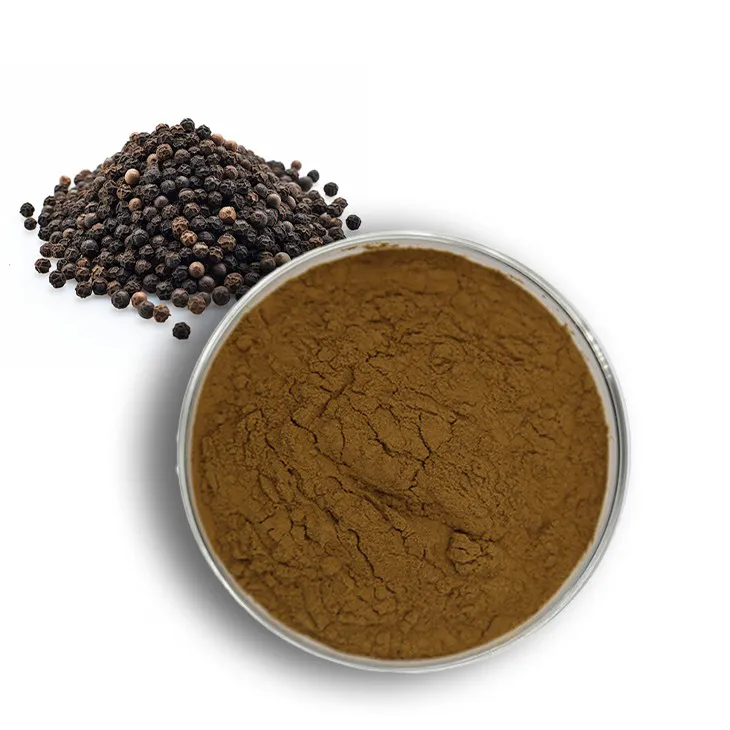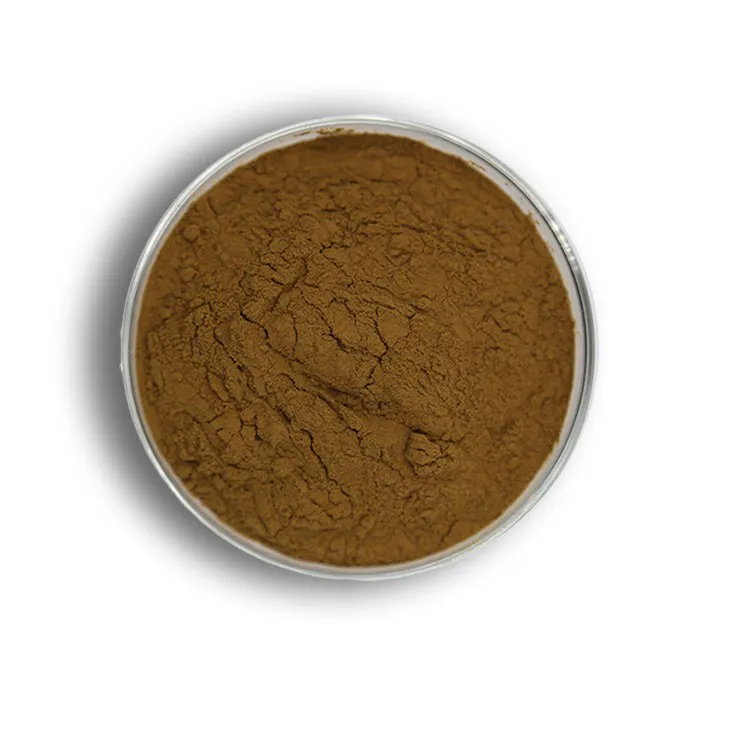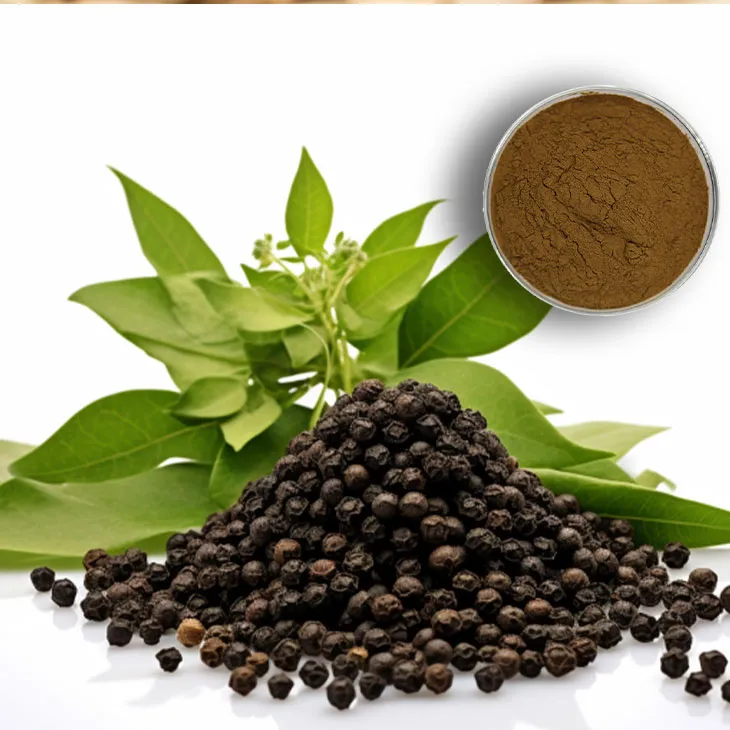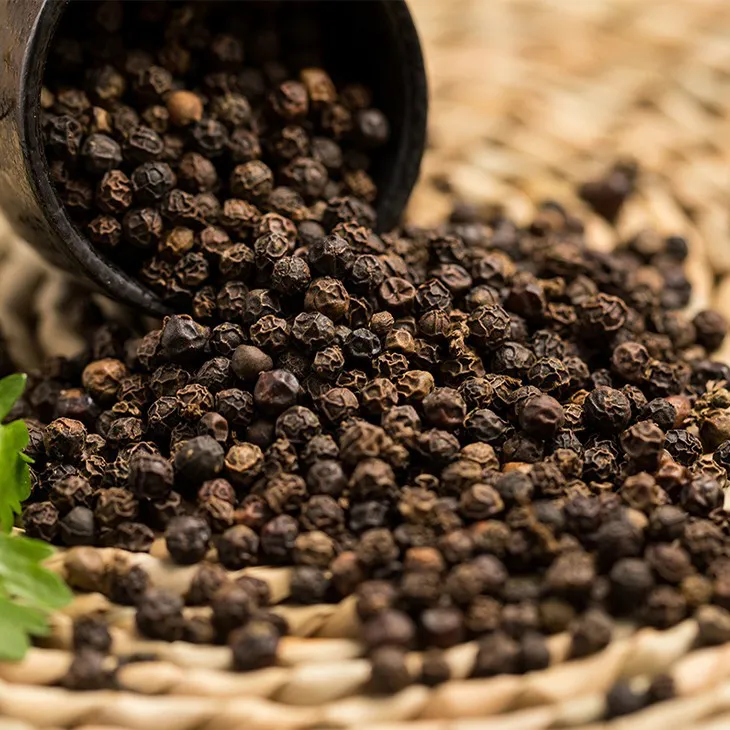- 0086-571-85302990
- sales@greenskybio.com
Complete Guide to the Grinding Process of Black Pepper Extract: Step - by - Step Key Points
2024-12-09

1. Introduction
Black Pepper Extract is widely used in various industries, such as the food, pharmaceutical, and cosmetic industries. The grinding process is a fundamental step in producing high - quality Black Pepper Extract. This article will provide a detailed and comprehensive guide on the key points of the grinding process, from raw material selection to quality control.

2. Raw Material Selection
The quality of the raw material, black pepper, directly affects the quality of the extract. Here are some important factors to consider when selecting black pepper for extraction:
2.1 Origin
Black pepper is grown in many regions around the world. Different origins may result in differences in flavor, aroma, and chemical composition. For example, black pepper from India is known for its strong and spicy flavor, while that from Brazil may have a milder taste. It is important to choose the origin based on the specific requirements of the end product.
2.2 Quality Grades
Black pepper is classified into different quality grades. High - grade black pepper typically has a larger size, a more uniform appearance, and a higher content of active ingredients. When selecting, look for peppercorns that are plump, free from mold, and have a shiny outer skin. Lower - grade peppercorns may contain more impurities and have a lower quality of flavor and aroma.
2.3 Harvest Time
The harvest time also plays a crucial role. Peppercorns that are harvested at the right time tend to have a more intense flavor and a higher content of essential oils. For black pepper, it is usually best to harvest when the berries are fully ripe but still firm. Harvesting too early or too late can result in a less - than - optimal product.

3. Pretreatment of Raw Materials
Before grinding, the black pepper needs to be pretreated to ensure better grinding efficiency and quality of the extract. The following are common pretreatment methods:
3.1 Cleaning
Black pepper may contain dirt, stones, and other impurities. Thorough cleaning is essential to remove these contaminants. This can be done by washing the peppercorns in clean water and then drying them completely. However, it is important to note that excessive washing may cause the loss of some volatile oils, so proper drying techniques should be used to minimize this loss.
3.2 Sorting
Sorting is used to separate the peppercorns according to their size and quality. This can be achieved through mechanical sorting devices or by manual selection. Larger and more uniform peppercorns are often preferred for grinding as they can result in a more consistent particle size distribution in the extract.
3.3 Drying
If the black pepper has a high moisture content, it needs to be dried. Drying helps to reduce the moisture content to an appropriate level, which is beneficial for grinding and the preservation of the extract. The drying temperature and time should be carefully controlled to avoid over - drying or under - drying. Over - drying may cause the loss of volatile components, while under - drying may lead to problems such as mold growth during storage.

4. Grinding Techniques
There are several grinding techniques available for Black Pepper Extract production, each with its own advantages and disadvantages.
4.1 Traditional Mortar and Pestle Grinding
This is a very traditional grinding method. It has the advantage of being able to produce a relatively fine powder with a certain degree of control over the grinding process. However, it is a time - consuming and labor - intensive method, and it is difficult to achieve large - scale production. It is more suitable for small - scale or home - made black pepper extract production.
4.2 Mechanical Grinding
- Roller Mill: Roller mills are commonly used in the industry. They work by passing the black pepper between two rollers that rotate in opposite directions. This method can produce a relatively uniform particle size and is suitable for continuous production. However, the grinding pressure and the distance between the rollers need to be adjusted according to the characteristics of the black pepper to ensure the quality of the grind.
- Hammer Mill: Hammer mills use high - speed rotating hammers to break the black pepper into small particles. They are capable of handling a large amount of raw materials quickly. However, the particle size distribution may be less uniform compared to roller mills, and there may be some over - grinding, which can lead to the loss of volatile components.
- Ball Mill: Ball mills are often used for fine grinding. They contain balls made of various materials such as steel or ceramic. As the mill rotates, the balls collide with the black pepper, gradually reducing it to a fine powder. This method can produce very fine particles, but it also has a relatively long grinding time and higher energy consumption.
4.3 Cryogenic Grinding
Cryogenic grinding involves freezing the black pepper to a very low temperature before grinding. This has several advantages. First, it can make the peppercorns more brittle, which is beneficial for grinding into a fine powder. Second, it can help to preserve the volatile components better as the low temperature reduces the evaporation of these components. However, cryogenic grinding requires special equipment and is relatively more expensive.

5. Grinding Parameters
Controlling the grinding parameters is crucial for obtaining high - quality black pepper extract. The following are the main parameters to consider:
5.1 Particle Size
The particle size of the ground black pepper affects the extraction efficiency and the quality of the extract. A smaller particle size generally results in a higher extraction rate as it provides a larger surface area for the solvent to interact with the active ingredients. However, if the particle size is too small, it may lead to problems such as clogging during extraction or the loss of volatile components due to excessive exposure. The optimal particle size usually ranges from 100 to 500 micrometers, depending on the specific extraction method and requirements.
5.2 Grinding Time
The grinding time should be adjusted according to the grinding method and the desired particle size. Longer grinding times may result in a finer particle size, but it may also cause over - grinding and the loss of volatile components. For mechanical grinding methods, the grinding time is usually within a few minutes to half an hour, depending on the equipment and the quantity of raw materials.
5.3 Grinding Speed
Grinding speed is an important parameter for mechanical grinding. Different grinding speeds can affect the particle size distribution and the quality of the grind. Higher grinding speeds may lead to a faster reduction in particle size, but it may also increase the risk of over - grinding and heat generation. Heat generation can cause the loss of volatile components and affect the quality of the extract. Therefore, the grinding speed should be optimized based on the specific grinding equipment and raw materials.
6. Quality Control during Grinding
Quality control during the grinding process is essential to ensure the consistency and quality of the black pepper extract. Here are some key aspects of quality control:
6.1 Particle Size Monitoring
Regularly monitoring the particle size of the ground black pepper is necessary. This can be done using particle size analyzers. If the particle size deviates from the desired range, adjustments should be made to the grinding parameters, such as the grinding time, speed, or the equipment used.
6.2 Temperature Monitoring
As mentioned earlier, heat generation during grinding can affect the quality of the extract. Therefore, temperature monitoring is important, especially for mechanical grinding methods. If the temperature rises too high, measures should be taken to cool the grinding equipment or adjust the grinding parameters to reduce heat generation.
6.3 Contamination Prevention
During grinding, there is a risk of contamination from external sources. The grinding equipment should be kept clean and free from foreign substances. Regular cleaning and maintenance of the equipment are necessary to prevent contamination.
7. Post - Grinding Handling
After grinding, proper handling of the ground black pepper is important to ensure the quality of the extract.
7.1 Storage
The ground black pepper should be stored in a suitable container in a cool, dry, and dark place. The container should be airtight to prevent the absorption of moisture and the loss of volatile components. If stored for a long time, it is advisable to check the quality of the ground pepper regularly to ensure that it remains suitable for extraction.
7.2 Packaging
When packaging the ground black pepper for further processing or sale, appropriate packaging materials should be used. The packaging should protect the product from moisture, light, and oxygen. Labels should be clearly attached, indicating the product name, origin, batch number, and other relevant information.
8. Conclusion
The grinding process of black pepper extract is a complex but crucial step in the production of high - quality black pepper extract. By carefully selecting raw materials, choosing appropriate grinding techniques, controlling grinding parameters, and implementing strict quality control measures, producers can ensure the production of black pepper extract with excellent quality, which can meet the requirements of various industries.
FAQ:
What are the main factors to consider in raw material selection for black pepper extract grinding?
When selecting raw materials for black pepper extract grinding, several factors are crucial. Firstly, the origin of black pepper matters. Different regions may produce black pepper with varying qualities in terms of flavor, aroma, and chemical composition. For example, black pepper from Kerala in India is known for its rich and distinct flavor. Secondly, the maturity of the black pepper berries is important. Fully ripe berries generally contain a more complete set of active ingredients. Also, the quality of storage of the raw materials should be considered. If the black pepper has been stored improperly, it may be affected by moisture, mold, or pests, which can then impact the quality of the extract. Finally, the variety of black pepper is a factor. Some varieties are more suitable for extraction due to their higher content of certain valuable compounds.
What are the common grinding techniques in black pepper extract production?
There are several common grinding techniques in black pepper extract production. One is mechanical grinding using a grinder. This can be a traditional mortar and pestle for small - scale or more artisanal production, which can provide a relatively coarse grind while maintaining some of the natural texture and flavor. For larger - scale production, industrial - grade mills are used. These can be either blade mills or burr mills. Blade mills are fast but may generate more heat during the process, which could potentially affect the quality of the extract if not carefully controlled. Burr mills, on the other hand, can provide a more consistent and finer grind. Another technique is cryogenic grinding. In this method, the black pepper is frozen before grinding. This helps to preserve the volatile compounds in the pepper as they are less likely to be lost during the grinding process due to the cold temperature, which in turn can lead to a higher - quality extract.
How can quality control be ensured during the grinding process of black pepper extract?
To ensure quality control during the grinding process of black pepper extract, several steps can be taken. Firstly, the equipment used for grinding should be regularly calibrated and maintained. This ensures that the grind size is consistent. For example, if the grinder settings change during the process, it can lead to an inconsistent particle size in the extract, which may affect its solubility and overall quality. Secondly, temperature monitoring is essential, especially when using mechanical grinding methods that can generate heat. If the temperature rises too much, it can cause the degradation of some of the active compounds in black pepper. Thirdly, regular sampling and analysis of the ground product should be carried out. This can involve checking for the presence of contaminants, the correct particle size distribution, and the concentration of key active ingredients such as piperine. Finally, the grinding environment should be clean and free from cross - contamination. This means that proper cleaning procedures should be in place between different batches of grinding to prevent the mixing of unwanted substances.
What role does particle size play in the quality of black pepper extract?
The particle size in black pepper extract has a significant role in its quality. A smaller and more uniform particle size generally leads to better extraction efficiency. When the particles are small, the surface area available for extraction solvents to interact with the active compounds in the black pepper is increased. This means that more of the valuable components such as piperine can be extracted. In terms of the final product, a proper particle size can also affect the solubility of the extract. If the particles are too large, the extract may not dissolve evenly in solvents or in products where it is incorporated, such as in food or pharmaceutical formulations. Additionally, particle size can influence the stability of the extract. Smaller particles may be more stable as they are less likely to settle or separate over time compared to larger, more heterogeneous particles.
How does the grinding process affect the flavor and aroma of black pepper extract?
The grinding process has a notable impact on the flavor and aroma of black pepper extract. If the grinding is too coarse, the release of flavor and aroma compounds may be incomplete during extraction. On the other hand, over - grinding can lead to the loss of some volatile compounds due to excessive heat generation or mechanical damage. The correct grinding technique, such as cryogenic grinding, can help to preserve the delicate flavor and aroma components. For example, the cold temperature in cryogenic grinding reduces the evaporation of volatile oils that contribute to the characteristic aroma of black pepper. Also, the speed of grinding can play a role. A slower grinding speed may be gentler on the black pepper and help to retain more of its natural flavor and aroma, while a very fast grinding speed may cause unnecessary disruption and loss of these qualities.
Related literature
- The Chemistry and Pharmacology of Black Pepper (Piper nigrum L.)"
- "Black Pepper: Production, Technology, and Quality Control"
- "Advances in Spice Extracts: Black Pepper as a Case Study"
- ▶ Hesperidin
- ▶ Citrus Bioflavonoids
- ▶ Plant Extract
- ▶ lycopene
- ▶ Diosmin
- ▶ Grape seed extract
- ▶ Sea buckthorn Juice Powder
- ▶ Fruit Juice Powder
- ▶ Hops Extract
- ▶ Artichoke Extract
- ▶ Mushroom extract
- ▶ Astaxanthin
- ▶ Green Tea Extract
- ▶ Curcumin
- ▶ Horse Chestnut Extract
- ▶ Other Product
- ▶ Boswellia Serrata Extract
- ▶ Resveratrol
- ▶ Marigold Extract
- ▶ Grape Leaf Extract
- ▶ New Product
- ▶ Aminolevulinic acid
- ▶ Cranberry Extract
- ▶ Red Yeast Rice
- ▶ Red Wine Extract
-
Shikonin
2024-12-09
-
Hops Extract
2024-12-09
-
Citrus bioflavonoids
2024-12-09
-
Grapefruit Seed Extract Powder
2024-12-09
-
Eyebright Extract
2024-12-09
-
Red Wine Extract
2024-12-09
-
Mangosteen extract powder
2024-12-09
-
Baicalin
2024-12-09
-
Stevia Extract
2024-12-09
-
Kupilu Extract
2024-12-09





















